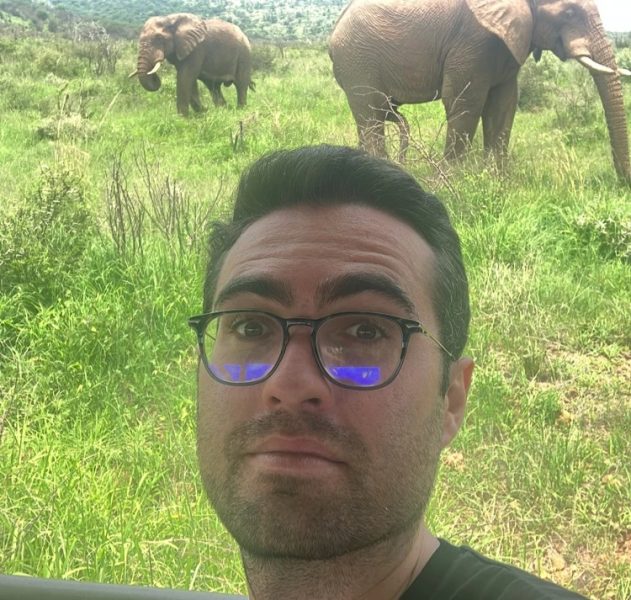The Elephant Protection Initiative (EPI) Foundation’s friend of the month is Alexander Stonor, an Africa-based Franco-British sustainability, environmental, social and governance (ESG) consultant. Alex aims to provide clarity and insights to his clients on the risks and opportunities of addressing sustainability, environmental, social and governance issues.
Previously, he worked as a humanitarian worker in India, an intelligence analyst in the UK, and a mining reporter across Africa (notably the DRC, Côte d’Ivoire, and South Africa). In this feature, Alex explains how his lifelong passion for elephants sparked his commitment to environmental stewardship and sustainable development.
With experience across the African continent, he shares his thoughts on how wildlife conservation, ethical investment, and local community empowerment can work hand in hand to secure a thriving future for both people and ecosystems.

Alexander Stonor
Elephants have been a passion of yours since childhood. Could you share more about this personal connection?
I have been fascinated by elephants for as long as I can remember. I wanted to be a vet growing up, mostly so I could take care of animals across Africa. Throughout my travels, I always make time to visit the nearest conservation site or wildlife park to bond with elephants. Elephants can teach us a lot about communication, mental strength, and wisdom. As someone passionate about elephants, how do you see the relationship between wildlife conservation and economic opportunities for local communities? Are there ways in which these two priorities can complement each other, rather than conflict?
Wildlife conservation and economic opportunities for local communities can complement each other through sustainable ecotourism, community-managed conservation areas, and ethical wildlife-related enterprises. By involving local communities in conservation efforts, such as through employment in ecotourism, anti-poaching initiatives, or sustainable agriculture, conservation can provide economic benefits while protecting elephant habitats. Empowering communities with financial incentives tied to conservation fosters long-term stewardship of wildlife rather than conflict over land and resources.
You’ve built a career focused on ESG (environmental, social, and governance) issues, particularly in the extractive industries. Was there a specific moment when you realised that bridging the gap between communities, financiers, and ecosystems was your calling?
What I find interesting in this field is the ability to bridge the financing gap between communities that need funding and investors who seek sustainable, impactful opportunities. By aligning a fund or a company’s ESG goals with local community needs, we can create models where both ecosystems and local populations thrive. Particularly across the most remote places of Africa, when local communities thrive, cohabitation with elephants becomes easier. Facilitating responsible investment in projects that support wildlife protection, sustainable livelihoods, and ethical resource management ensures long-term benefits for all stakeholders involved.
One of the key aspects of your work seems to be bridging the gap between financiers and communities. How do you ensure that financial investments not only lead to tangible improvements for local communities but also promote environmental sustainability?
I prioritise projects that align economic incentives with community-driven goals. By working closely with communities, investors, and regulators, we design initiatives such as sustainable mining, ecotourism, and conservation-linked enterprises that generate both social and environmental benefits. Continuous monitoring, community engagement, and long-term sustainability planning are key to ensuring that investments deliver meaningful, lasting impact.
Extractive industries in Africa, such as oil drilling and mining, have caused enormous damage to the environment and wildlife through deforestation, pollution, and so on. How can we create a new and sustainable model?
It is undeniable that extractive industries in Africa have historically caused significant environmental damage, including deforestation, pollution, and habitat destruction. These impacts cannot be ignored. However, focusing solely on the destructive side of these industries overlooks a critical aspect: the growing willingness of many companies to invest in conservation and protection initiatives. During my years as a reporter and ESG analyst across the continent, I have witnessed it firsthand.
Whether it is pushed by ESG-savvy investors, a more demanding and conscious society, or a growing sense of accountability among company boards, efforts to integrate sustainability are becoming more widespread. I truly believe we must engage with these industries constructively, encouraging them to adopt sustainable practices and support ecosystem preservation.I have seen such initiatives bring amazing progress to wildlife areas in South Africa, notably.
By fostering partnerships between companies, governments and local communities, we can channel the financial power of the extractive sector towards meaningful environmental stewardship. In an increasingly interconnected world, where actions are scrutinised and industries operate under the watchful eyes of millions, stakeholders are more committed than ever to improving historical practices.
This presents an unparalleled opportunity for the conservation sector to engage with these industries, guiding them toward sustainability. By working together, we can shift the narrative from merely exposing environmental harm to actively creating solutions that balance economic development with ecological preservation.
